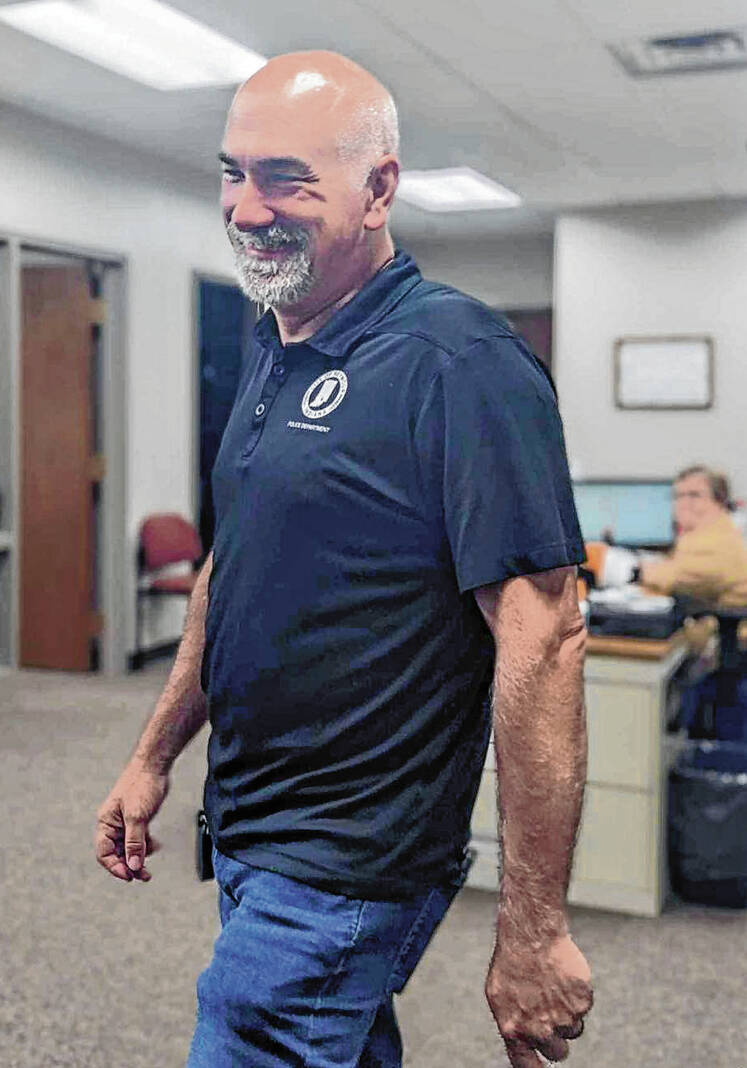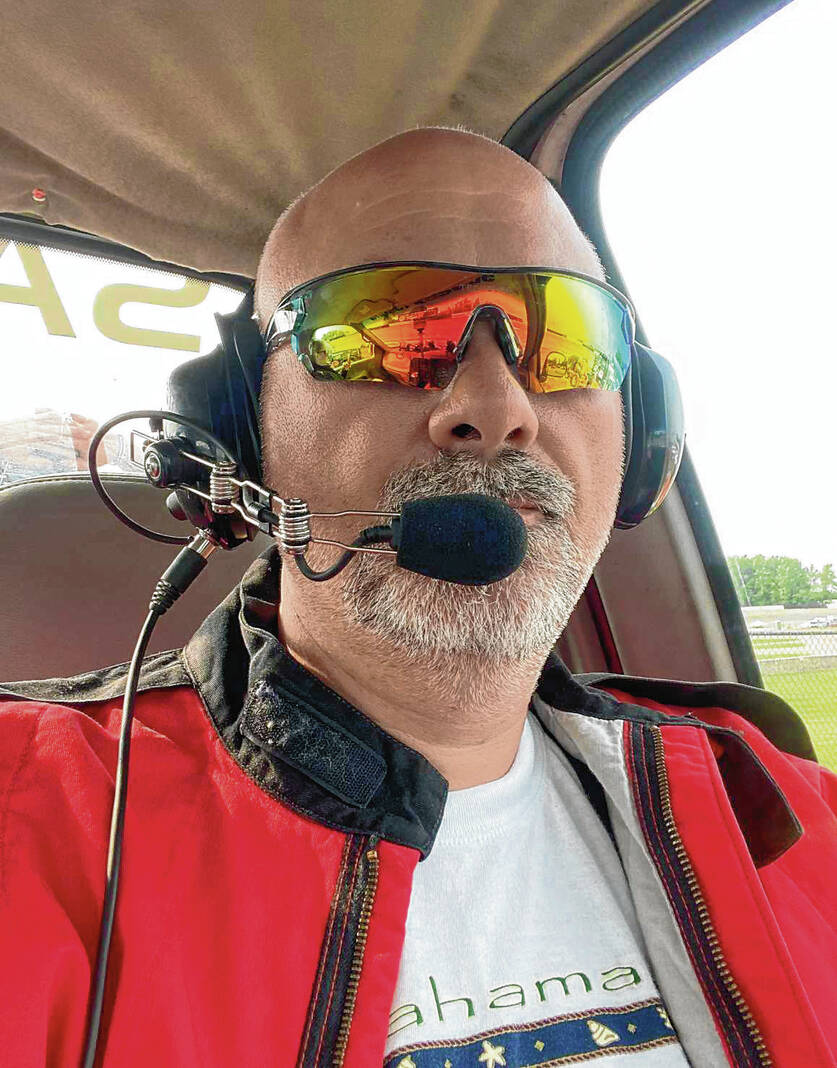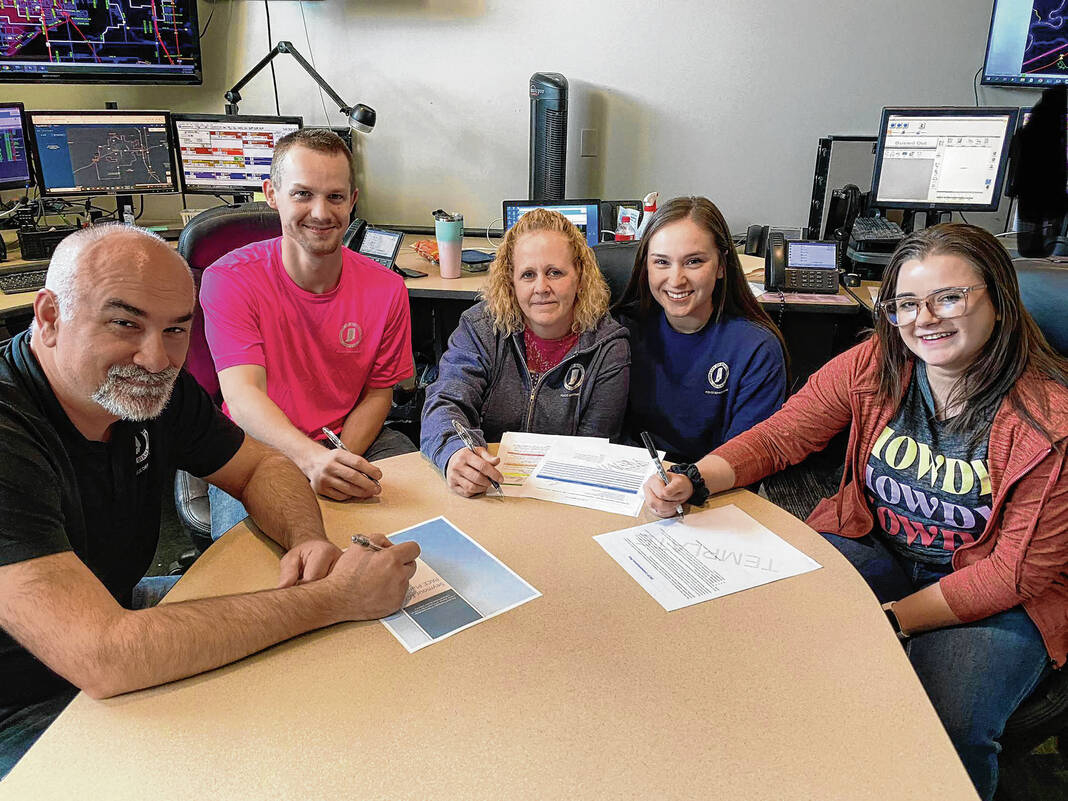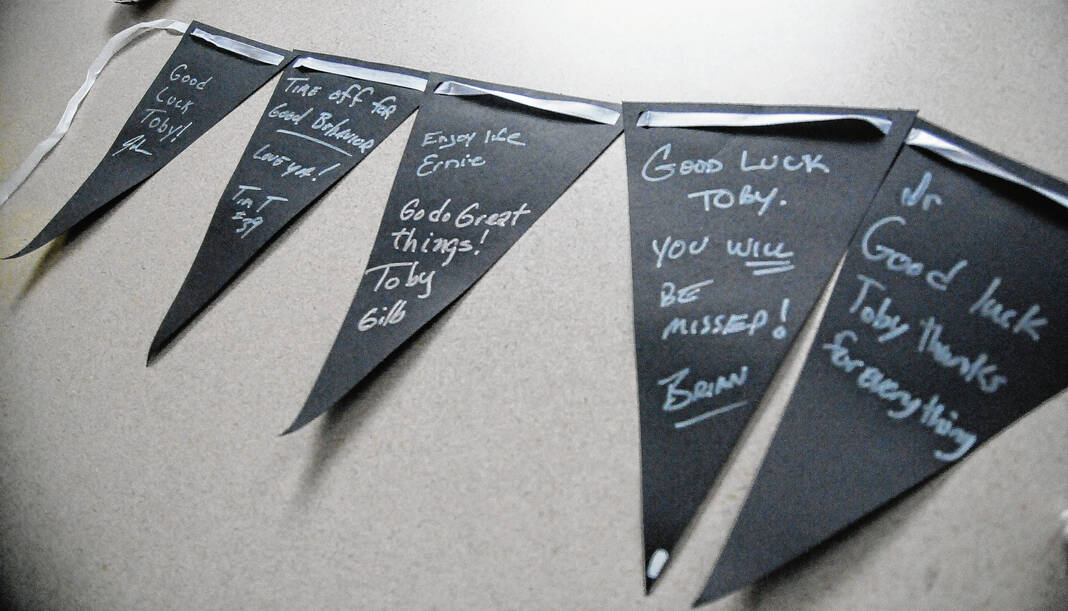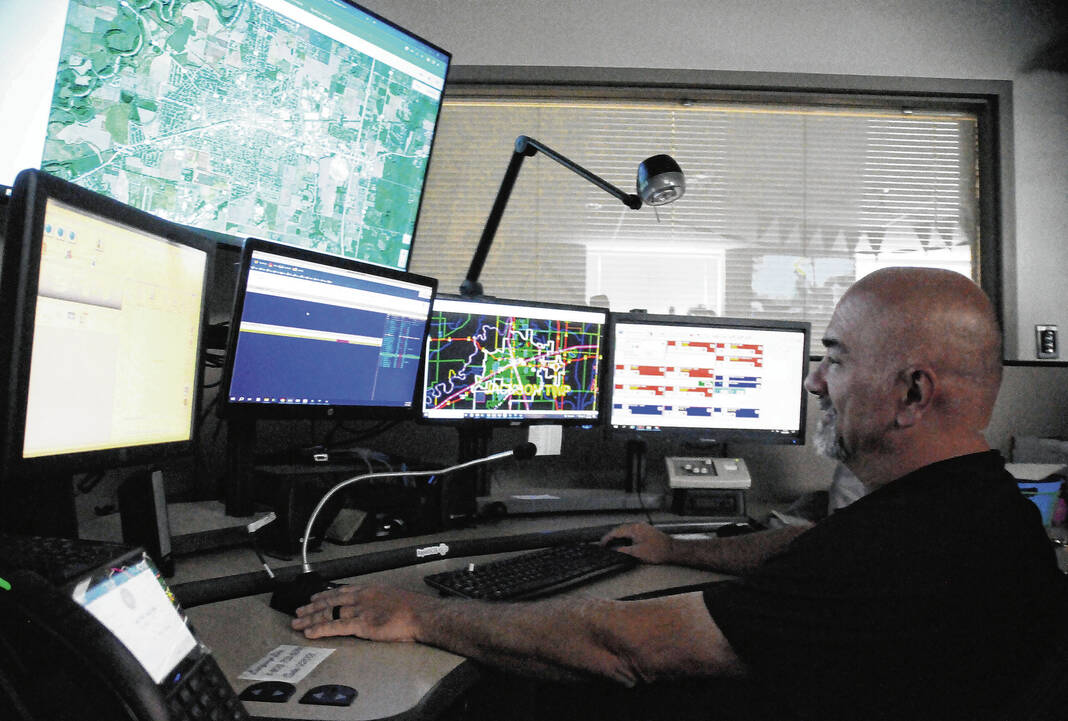While working at a local manufacturing facility, Toby Ortman realized if he stayed there, he knew exactly what he would be doing each day.
He said that about drove him nuts.
In his exit interview, the human resources representative asked why he wanted to leave a good-paying job. He said, “I’ve got to help people.”
He had served as a firefighter in his hometown of Crothersville since 1992, and his father and uncle both had been firefighters, too.
They were his biggest influences in getting into public safety. In 1999, Ortman served as a dispatcher for the Jackson County Sheriff’s Department in Brownstown for a few months before transferring to Seymour Police Department.
Aug. 2 marked his last day on the job there after 24 years of service.
“I’ve always loved that I’ve never known what’s going to happen, but I know that I have the confidence that whatever happens, I can take care of,” Ortman said. “Now you could fall apart after (a tough call). If you need to step out and think things over, do that, but once you’re in that chair, you’ve got a job to do.”
Since being a dispatcher is mentally taxing, Ortman said the average length of a career in that field is three years. He worked in the field eight times that.
“It means something. It makes a difference,” he said of what kept him in it.
In his 24 years, though, he said only one caller he helped came to the police station to thank him.
“It’s a thankless job, but you’ll never get rich helping people,” Ortman said. “If they come in thinking they are the star of the show … it’s nothing about any of the dispatchers. It’s about responder safety. Now we do make a difference. You get that one call that just charges you up to where you know for a fact without any doubt at all you are the reason why they are alive today.”
On his last day at SPD, Ortman received a nice farewell with a cookout. Current and former personnel and others stopped by to wish him the best in his next venture.
The department and city also posted about him on their Facebook pages.
“Several current and former SPD officers started their law enforcement careers by beginning in dispatch, most of whom were trained at some point by Toby,” the SPD post says. “His calm, collected voice has helped save, change and make better the lives of countless people over the past two and a half decades. Thank you, Toby, for all of your years of steadfast service with the department and to our community as a whole.”
The city post says if you’ve ever called SPD, you’ve likely heard Ortman’s voice.
“(He) has trained many dispatchers to be the calm and reassuring voice you hear when you dial 911,” the post says. “Congratulations on your retirement, Toby! Thank you for your many years of service to our community. We will miss you.”
After graduating from Crothersville High School in 1992, Ortman said he worked a variety of jobs.
“I’ve always had three or four jobs,” he said. “My record is five jobs at once.”
During his short stint at the sheriff’s department, he was the only dispatcher one night when the jail inmates started a riot. That began right after a man came into the dispatch room and said, “Well, looks like a quiet night.”
“Literally no sooner than he said that, the inmates, they had toothpaste on paper and they covered up all of the cameras, and when all of the cameras were covered up, the whole jail started vibrating because they were pulling the porcelain sinks and toilets and they were busting everything up,” Ortman said. “They set fire to the mats and the smoke came down, and we had guys in the drunk tank screaming, the guys upstairs were screaming.”
A new jailer helped Ortman, and then a road officer arrived to assist.
“We just did what was needed because those (inmates) would have died because the smoke was so thick,” Ortman said. “We got all of the inmates out, laid them down. The ambulance got there and I went around with an oxygen tank and a mask getting all of the inmates oxygen because they had bad smoke inhalation. It was one of those in-the-moment things where there was more reaction than thinking. You just did what was needed.”
On Nov. 11, 1999, he started at SPD. He worked third shift dispatch for about 10 years and then a swing shift for six years.
Early on, Ortman said he worked many nights by himself. Now, it’s state-mandated to have at least two dispatchers working at the same time.
One of the biggest changes during his tenure was technology.
In the beginning, he said they used the Spellman computer-aided dispatching and paper maps as they took calls and communicated with officers via VHF radios.
Around 2005, they switched to the statewide 800 megahertz radio program, and coverage was a lot better.
Over the years, Ortman attended telecommunications conferences to network and learn about the latest technology.
“I’ve gotten to know a lot of great people in the business,” he said. “I’ve worked really, really hard to be one of those people that is on the forefront of technology because there are a lot of cool things out there, and if you go to these conferences and you see some of the things, you’re like, ‘What?’ There are a lot of great companies out there that have the best interest in mind.”
One of the programs he brought to SPD is RapidSOS. Through the free program, dispatchers are provided a geospatial location of a 911 caller and notified of a call before the phone rings at the dispatch center.
“The RapidSOS takes the secondary data from apps, from your phone itself and it really is like sticking a pin in the back of a caller,” he said.
Texty 911 is new at SPD. Through Prepared 911, dispatchers can send a link to a 911 caller, and once that’s accepted, they can have eyes on the scene before responders arrive and text with the caller. It even allows a person to text in Spanish and it’s translated to English for the dispatcher or vice versa.
“This job is really a lot like real estate — location, location, location,” Ortman said. “We get people from Point A to Point B as safely and as quickly as possible, and safety being No. 1, you always want to know where your caller is at all times. Whether they are mobile in a car or whether they are stationary sitting on the couch, you always want to know where they’re at.”
Several years ago, Ortman moved to day shift and was promoted to supervisor. Then he was involved in the hiring of dispatchers and staffing. He oversaw 13 dispatchers.
He said it was his responsibility to ensure they understand all responders go home and caller care is No. 1.
Working with police, fire and emergency medical services personnel, he said it sometimes takes years for them to gain trust in a dispatcher.
“It takes only seconds to violate that trust to where you messed up,” Ortman said. “I was raised up in this business with some very good mentors. I’ve had a lot of good mentors and officers. I’ve known a lot of good officers. A lot of these guys I’ve worked my entire career with.”
As far as callers, Ortman said it could be the worst day of their lives.
“It’s unlike any other job in the world, where you’re dealing with people’s lives and you always do everything you can for somebody in that situation. They are expecting excellence,” he said. “Yeah, there are downtime moments, but there are also times when it’s business and you have to do what’s needed.”
So what makes a good dispatcher? Ortman said he looks for someone who is humble and has a servant’s heart. They also need to understand they will receive a variety of calls.
“We clock in at 6 a.m., and by 6:05, you could have a massive personal injury accident, helicopter is coming, and then by 6:30, you could have somebody calling you to complain that their neighbor is blowing grass in their yard,” Ortman said. “You have to be understanding. … You have to wear many, many hats if you’re a dispatcher.”
He said it’s good dispatchers are now recognized as first responders.
“For years, we’ve always been secretarial or clerical,” he said. “That has changed to where we’re actually now considered first responders. We’re actually the first first responders.”
He also said there’s more talk these days about dispatchers’ mental health.
“When I started, there was no talk of mental health. Whatever you went through, you suffered in silence. You didn’t talk about it because that would make you look weak. You didn’t want to look weak,” he said.
“Now for dispatch, mental health is on the forefront,” he said. “There’s a saying that says, ‘My ears have heard what my brain will never forget.’ Post-traumatic stress disorder is very real in this business. I used to think it was just soldiers, important people that were on the front lines in combat, that got PTSD. Well, now, they find that police, fire, EMS, about any first responding calling, you’re subjected to PTSD.”
As for his decision to retire from SPD, Ortman said it was hard because he enjoyed the job and the people.
Even though he started his new job Monday with Integrated Public Safety Commission in Greenwood, he said he would like to stay on at SPD as a part-time dispatcher.
“If they need anything, I’ll certainly do anything for them. They can call, and if my schedule can do it, I’ll come in and fill in,” Ortman said. “If I have any say on it, I will always stay connected in something that serves the first responders.”


